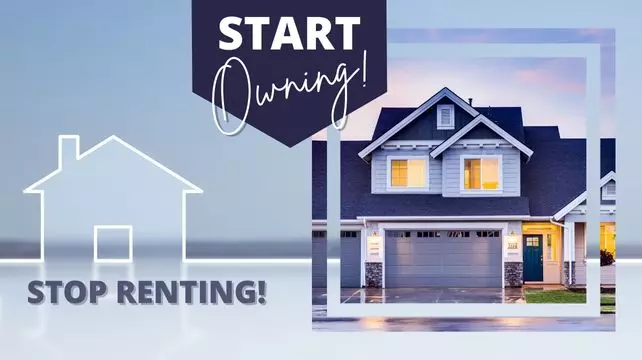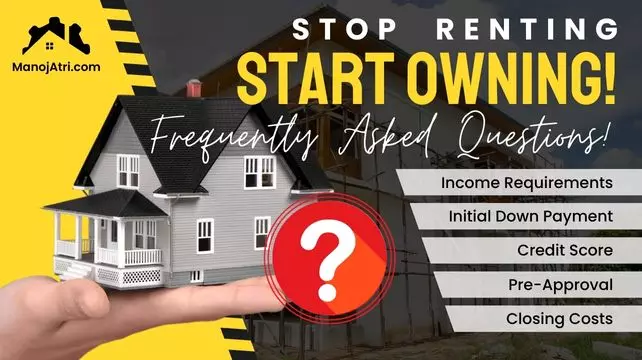🛑🏠 Don't Pay Another Cent in Rent to Your Landlord:🔑💰 Before You Read This FREE Special Report! 🎁🎉 

The Dream of Owning a Home is not out of reach!
STOP Paying Your Landlord's Mortgage And START Building Your Own Equity!
Download Your FREE Report STOP Paying - Your Landlord's Mortgage Now and Take the First Step Toward Owning Your Dream Home!
If you're like most renters, you feel trapped within the walls of a house or apartment that doesn't feel like yours. How could it happen when you're not even permitted to bang in a nail or two without a hassle. You feel like you're stuck in the renter's rut with no way of rising up out of it and owning your own home.
Also are you tired of throwing your hard-earned money away on rent every month? If so, it may be time to consider buying a home and building equity for yourself instead of your landlord. By owning your own home, you have the ability to invest in your own future and create a stable living situation for yourself and your family.
Well don't feel trapped any more! A new FREE Special Report entitled
"How To STOP Paying Rent and START Owning Your Own Home"
has already helped dozens of local renters get out from under their landlord's finger, and move into a wonderful home they can truly call their own. You can make this move too by discovering the important steps detailed in this FREE Special Report.
It doesn't matter how long you've been renting, or how insurmountable your financial situation may seem. With the help of this report, it will become suddenly clear to you how you really can save for the down payment and stop wasting thousands of dollars on rent.

What are the benefits of Owning a Home versus Renting?
Owning a home offers several advantages over renting. First, you have complete control over your property and can make changes or improvements as you see fit. This is in contrast to renting where you are limited in what you can do with the property. Additionally, owning a home can provide a sense of stability and security, as you have a long-term investment in the property.
Another benefit of owning a home is the potential for appreciation in value over time. As the property increases in value, so does your investment, which can be a valuable source of equity. Renting, on the other hand, typically does not offer any appreciation in value, and you are simply paying to use someone else's property.

How can I determine if I am Financially ready to Buy a Home?
Another important factor to consider is your long-term financial goals. Owning a home can be a good investment and a way to build equity over time, but it's important to make sure that you can afford the monthly mortgage payments and ongoing expenses without sacrificing other financial goals such as retirement savings or paying off debt. By carefully assessing your current financial situation and considering your long-term goals, you can determine if you are financially ready to take the leap into homeownership.

What are some common misconceptions about the Homebuying process?
Another common misconception is that the homebuying process is quick and easy. While it can certainly be an exciting and rewarding experience, it is also a complex process that requires careful consideration and preparation. From finding the right home and obtaining financing to negotiating the sale and closing the deal, there are many steps involved in buying a home. It is important to work with a knowledgeable and experienced real estate agent who can guide you through the process and help you avoid common pitfalls.

What are the Steps involved in Buying a Home?
One important step that many people overlook is the importance of working with a reputable and experienced real estate agent. An agent can help guide you through the process, answer your questions, and provide valuable insights and advice. They can also help you find properties that meet your specific requirements and negotiate on your behalf to ensure you get the best possible deal. With their help, you can navigate the complex homebuying process with confidence and ease.

How can I save for a Down Payment on a Home?
Another way to save for a down payment is to explore alternative housing options while you save. For example, you could consider living with family or renting a smaller, more affordable apartment for a period of time. This can help you save money on rent and other expenses, allowing you to put more towards your down payment. Keep in mind that the larger your down payment, the lower your monthly mortgage payments will be, which can help make homeownership more affordable over the long term. By taking a strategic approach to saving for a down payment, you can put yourself on the path to achieving your dream of homeownership.

What are some Financing options for First-Time Homebuyers?
Another option is to consider a low down payment mortgage, which allows you to purchase a home with a smaller down payment than traditional mortgages. You can also look into programs offered by your province or territory, such as the Homeownership Assistance Program, which provides financial assistance to first-time buyers in certain areas. Whatever option you choose, be sure to do your research and speak with a qualified mortgage professional to find the best financing solution for your situation.

How can I find the Right Home for my needs and Budget?
Another way to find the right home is to attend open houses and home showings. This will give you an opportunity to see homes in person and get a feel for what you like and dislike. Take notes and ask questions during these visits to help you narrow down your search. You can also browse online listings and use real estate apps to search for homes in your preferred location and price range. Remember to stay patient and flexible during the home search process, as it can take time to find the right home that meets all of your needs and budget.

What are some Tips for Negotiating the Purchase of a Home?
Another tip is to work with a qualified and experienced real estate agent who can help guide you through the negotiation process. They can provide insight into the local market and help you craft a competitive offer that is more likely to be accepted by the seller. Additionally, they can act as a mediator between you and the seller to ensure that the negotiation process is professional and respectful. Overall, negotiating the purchase of a home can be a complex process, but with the right mindset and support, you can secure a home that fits your needs and budget.

How can I avoid common Homebuying Scams and Pitfalls?
Another scam is the fake real estate agent or mortgage broker, where the fraudster poses as a legitimate professional to obtain personal and financial information from the buyer. To avoid this, always verify the credentials of any professional involved in the homebuying process, and never share personal or financial information unless you are certain of the legitimacy of the person or organization.
-
Question: What are the benefits of owning a home compared to renting?
Answer: Owning a home offers long-term stability, potential equity appreciation, the freedom to customize your space, tax benefits, and the opportunity to build wealth through homeownership. -
Question: How much do I need for a down payment when buying a home?
Answer: The down payment amount can vary, but it is typically recommended to aim for a down payment of 10% of the home's purchase price. However, there are also options available with lower down payment requirements, such as First-Time loans with 5% down. -
Question: What factors should I consider when determining if I'm ready to transition from renting to owning?
Answer: Factors to consider include financial stability, readiness for long-term commitment, a steady income, the ability to cover homeownership costs, a favorable credit score, and a desire for more control over your living space. -
Question: How can I improve my credit score to increase my chances of getting a mortgage?
Answer: You can improve your credit score by paying bills on time, reducing outstanding debts, keeping credit card balances low, avoiding new credit applications, and reviewing your credit report for any errors that need to be corrected. -
Question: What is the first step in the home buying process?
Answer: The first step is usually to get pre-approved for a mortgage. This involves providing necessary financial information to a lender who will assess your eligibility for a loan and provide you with a pre-approval letter. -
Question: How does the cost of owning a home compare to the cost of renting?
Answer: While owning a home may come with additional expenses such as property taxes, maintenance, and insurance, in the long run, it can often be more cost-effective than renting, as you are building equity and potentially benefiting from property appreciation. -
Question: What are some common misconceptions about homeownership?
Answer: Common misconceptions include the belief that renting is always cheaper, that you need perfect credit to qualify for a mortgage, and that you need a large down payment. It's important to research and understand the true facts about homeownership. -
Question: Are there any financial assistance programs available for first-time homebuyers?
Answer: Yes, there are various financial assistance programs available for first-time homebuyers, such as First-time loans, RRSP and down payment assistance programs offered by state or local agencies. -
Question: How long does it typically take to complete the home buying process?
Answer: The timeline can vary, but on average, it takes about 30 to 60 days to complete the home buying process from the time you have an accepted offer to the closing day. -
Question: What are some key factors to consider when choosing the right home to purchase?
Answer: Key factors include location, affordability, size and layout, neighborhood amenities, proximity to schools and workplaces, future growth potential, and compatibility with your long-term goals and lifestyle.
Please note that these answers are provided as general guidance and may vary based on individual circumstances and location. It's recommended to consult with professionals, such as real estate agents and lenders, for personalized advice tailored to your specific situation.
Act Now: In conclusion, renting may feel like a temporary solution, but it doesn’t have to be your long-term reality. With the right strategies and guidance, you can break free from the cycle of paying rent and take the first step toward owning your own home. Whether it’s through creative financing, rent-to-own programs, or smart budgeting, homeownership is within your reach. To learn how you can make this life-changing transition, Sign Up now to receive your FREE Guide: How To STOP Paying Rent and START Owning Your Own Home! This invaluable resource will provide you with actionable steps, expert advice, and proven strategies to turn your dream of homeownership into a reality. Don’t wait - download your free guide today and start building equity in your future!
 Order this FREE Report NOW and fully review how you can save for the Down Payment and stop wasting thousands of Dollars on Rent!
Order this FREE Report NOW and fully review how you can save for the Down Payment and stop wasting thousands of Dollars on Rent!


